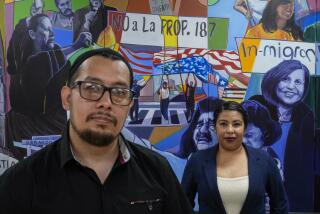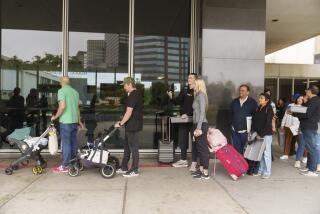New Passport Rules Are Largely a Family Matter
If youâre planning to travel abroad this summer, you should start thinking about passports now. Apart from the usual seasonal rush, there are two new child-related passport laws that take effect this year, one likely to ease life for international families, the other likely to complicate life for one-parent households.
Furthermore, passport workers who sniff out attempted deceptions have new tools in their fight against fraud.
The coming season should be the first concern for most travelers. Summer is always the most harried time at any passport office because thatâs when most foreign trips are taken.
Many travelers treat passport chores the way they treat dental work: They procrastinate or forget, then suddenly wake one day with an urgent need.
Tom Reid, regional director of the Los Angeles Passport Agency, says it takes about four weeks to process a passport application, although that sometimes stretches to five in the summer. If you give yourself at least that much lead time, you can comfortably apply through one of the 114 Southern California post offices and other sites, including some libraries and city clerk offices, that handle applications.
To find the facility nearest you, you can call the National Passport Information Center, telephone (900) 225-5674, which charges 35 cents a minute, or (888) 362-8668, which charges a flat fee of $4.95 billable via credit card number, or you can consult the agencyâs Web site at https://www.travel.state.gov/passport_services.html.
The only solution for those passport seekers who wait too long and need âexpedited serviceâ is to make an appointment at the passport agency offices in the federal building in Westwood, 11000 Wilshire Blvd. (telephone [310] 575-5700), and prepare to sit or stand in a waiting room crowded with glum fellow citizen-customers. Be aware that expedited service adds $35 to the basic fees of $60 per adult applicant older than 16, $40 for those younger than 16. Renewals cost $40.
The Los Angeles Passport Agency office processes documents for Californians from San Luis Obispo County south to the Mexican border, as well as residents of Las Vegas and the rest of Clark County, Nev.
The L.A. office typically schedules 350 to 400 âexpedited serviceâ appointments daily for travelers who are leaving the country within 14 days. In summer, that load can increase to 500 daily. The overall application backlog reached 25,000 last summer, Reid said, all stacked in cabinets along the aisle that workers call âadjudication boulevard.â
This yearâs backlog may not be as dramatic. Through the first four months of this year, applications are off 2% from last year, Reid said. He blames the sputtering economy, strained relations with China and tourist concerns about foot-and-mouth disease in Eur-ope.
Even in years with no such concerns, most Americans stay home. Only an estimated one in seven U.S. citizens holds a passport.
If your passport is in order, two newly enacted federal laws could affect your family.
One of the laws may simplify life for many families. Since Feb. 27, citizenship applications (hence passport applications) have been streamlined for internationally adopted children and other foreign-born children of U.S. citizens. The Child Citizenship Act, which applies to adopted and biological children of U.S. citizens, gives foreign-born children automatic U.S. citizenship if one parent is a U.S. citizen and the child is younger than 18, lives in the United States as a lawful permanent resident alien and is in the legal and physical custody of the U.S. citizen parent. (If the child is adopted, the adoption must be final.)
The second new passport-related law, which is scheduled to take effect July 2, may have more complicated results, especially in one-parent households.
It requires both parents or guardians to sign passport applications for children younger than 14. Until now, federal officials have required only one parentâs signature.
Federal officials have been working since last year on alternative provisions for those cases where one parentâs signature is unobtainable (because of death or estrangement, for instance). The provisions are to be in place by the time the law takes effect but were still in the works as recently as this month.
âItâs to prevent child abductions. Itâs for a good cause,â Reid said. âBut in practicality itâs going to have some difficulties. ... Part of the problem is that most of the children who are abducted already have dual nationality, so they can travel under their other passports.â
A related caution: Many countries, including Mexico and Canada, require written permission from both parents or the absent parent (or the relevant custody document) for minor children entering with only one parent or a guardian.
Check with the destination countryâs consulate, for the definition of âminorâ varies; in Mexico, itâs under 18, in Canada, 16. (Some country requirements are posted on the State Department Internet net site, https://www.travel.state.gov/foreignentryreqs.html.)
One more major change in the passport office since last year: In November the agency completed a modernization thatâs expected to cut fraud dramatically.
After decades of trimming passport photos to specified size and then pasting them into booklets, the agency has switched to a digital photo-handling process that imprints images on protected booklet paper. This makes photo substitution all but impossible, Reid said, and will probably give investigators more time to probe other passport-related crimes.
*
Christopher Reynolds welcomes comments and suggestions but cannot respond individually to letters and telephone calls. Address comments to Travel Insider, Los Angeles Times, 202 W. 1st St., Los Angeles, CA 90012, or send e-mail to [email protected].
More to Read
Sign up for The Wild
Weâll help you find the best places to hike, bike and run, as well as the perfect silent spots for meditation and yoga.
You may occasionally receive promotional content from the Los Angeles Times.







